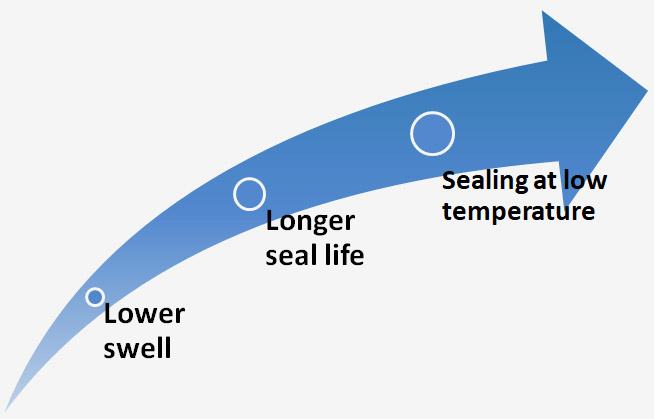NEWSLETTER
Sign up for GMORS latest news.
In recent years, due to automotive emission regulations, an increasing number of car engines are using Gasoline Direct Injection (GDI) technology. Although GDI can improve fuel efficiency and reduce NOx emissions, the pressure of fuel injected into the combustion chamber is at a much higher level.
An increase in pressure will result in the decrease of molecular free volume, which gives rise to an increase in the glass transition temperature (Tg) of the elastomeric material. The increase in Tg will be at a shift of approximately 1ºC (1.8ºF) for every 52bar (750psi) increase in pressure.
As an elastomeric material under low temperature service conditions approaches the glass transition temperature, it undergoes a phase change from a rubberlike phase to a glassy state, losing its elasticity and its ability to perform under pressure as it becomes more brittle. The most notable incident caused by an O-Ring failure was the space shuttle Challenger disaster of 1986. The O-Ring seals, which were FKM, were not designed to withstand the exceptionally low temperature conditions at the time of the shuttle launch.
The choice of the right elastomer for low temperature sealing applications is important. GMORS conducts extensive research and development on extremely low temperature FKM elastomers based on perfluorinated monomers. However, other requirements like low compression set, lower volume swell, resistance to chemical media and other mechanical properties must also be considered because rubber sealing components are often exposed to temperature, pressure and fluid media that can affect its performance.
As shown in Chart 1 below, we develop material formulations based upon customer requirements in terms of color, hardness and low temperature resistance. Among the properties, lowest temperature resistance can reach TR10: -45°C (-49°F) and hardness of SHORE A 60 ~ 90.
In addition to satisfying the low temperature requirements of our customers, our seals also have excellent resistance to rapid gas decompression (RGD), chemical media and are highly durable. For the oil well market, NORSOK M710 RGD certified compounds V9181AA (-40°C) and V9194AA (-45°C) are highly recommended.
| TR10 | TR10: -35˚C (-31˚F) | TR10: -40˚C (-40˚F) | TR10: -45˚C (-49˚F) | |||||||
|---|---|---|---|---|---|---|---|---|---|---|
| GMORS COMPOUND | V7084AA | V8084AC | V8184AA | V9084AA | V6081AA | V7081AA | V7581AA | V9181AA | V7094AA | V9194AA |
| Color | ⬤Black | ⬤Brown | ⬤Black | ⬤Black | ⬤Black | ⬤Black | ⬤Black | ⬤Black | ⬤Black | ⬤Black |
| Hardness, (Shore A) | 72 | 83 | 83 | 88 | 63 | 73 | 79 | 91 | 71 | 89.5 |
| Low Temperature Retraction Test , TR10 | -35.9˚C | -36.2˚C | -35.4˚C | -36.4˚C | -40.6˚C | -40.4˚C | -40˚C | -40˚C | -44.5˚C | -44.7˚C |
| NORSOK M-710 and ISO23936-2 RGD Test Certificate | X | X | X | X | X | X | X | ✓ | X | ✓ |
(Chart 1)
The application of low temperature resistant seals in the market will become increasingly widespread, especially in the automotive, aerospace and oil well markets. From the development of the rubber material to the design of the mold and the final manufacturing of the product, GMORS focuses on the concept of “One Seal Fits All”. (Table 2)
| Long-term Sealing | Chemical Compatibility | Low Temperature |
|
|
|
(Table 2)
In addition to low temperature resistance, our products can also meet the requirements of sealing applications in fuels containing MeOH/EtOH and in application environments of biomass fuels and other media. (Table 3). At the same time, we take into account product safety and product service lifetime which our users are most concerned about in providing a best sealing solution.
Ultra-low temperature FKM have has improved fuel compression set resistance and low temperature performance

(Table 3)
Sign up for GMORS latest news.
Copyright ©GE MAO RUBBER INDUSTRIAL CO., LTD. All rights reservedTerms and Conditions|Privacy policy